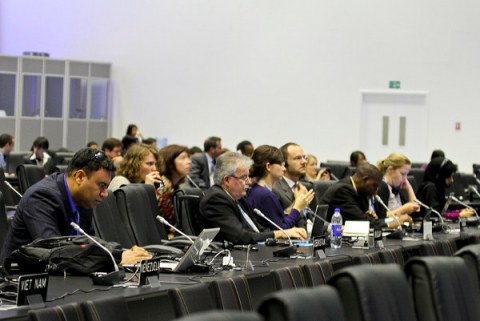One week into the UN climate change negotiations in Warsaw, here is an overview of what groups are still pushing too and if there has been any movement. Typhoon Haiyan has been an underlying reminder to all negotiators that there is an urgent need for concrete solutions to curb emissions.
COP19 could be seen as the linkage of climate science with climate policy, but the connection is yet to be made within the actual text (for the final agreement). Parties have a mammoth task of negotiating mutual cuts to emissions and financing clean energy funds.
It is hoped that the imminent pledges and commitments will pave the way for an internationally binding climate agreement in Paris in 2015.
There are conflicting goals, national and also regional interests from all of these groups. During these negotiations, it hasn’t been been evident how global consensus will yet be agreed upon with more focus on process negotiations as opposed to examining timelines.
UNFCCC Executive Secretary Christiana Figueres expressed the need “to urgently harness all existing momentum and use all the tools we have at our disposal to shift to low-carbon and build resilience to climate change.”
Polish Environment Minister and COP19 President Martin Korolec’s top priority at the conference has been to ensure that the negotiations are democratic and transparent, “making the parties and other partners feel responsible for their contribution.”
The EU is a key player in the negotiations and have been keen to demonstrate leadership towards an ambitious and single legally binding agreement before Paris 2015. They are expected to agree on increasing climate finance and suggest identifying alternative ways of sustaining an industrial and financial system dependent on coal, oil and gas.
There are concerns that the EU’s push to expand carbon markets would simply benefit large polluters. Tamara Gilberston from Carbon Trade Watch argued that “the European Commission and the carbon crooks who turn profits from the failing Emissions”.
Climate finance is the critical issue of these negotiations, particularly loss and damage which is still a vague principle. The US delegation is interested in resolving this, but cautious that any agreement would struggle for ratification within the US Congress.
Expectations for COP19 are still low, yet the awareness of the need for progress in the lead up to Paris is paramount. The UK’s former lead negotiator John Ashton believes that, “we are now in a critical two years… we won’t get another bite of the cherry.” The ball is, and has always been in, the negotiators court – and they have another week to do something about it.
The ball is now in the negotiators’ court and even though COP19 begins on a morose note, it is hoped that Figueres’ plea to “win the Warsaw opportunity” will not fall on deaf ears.
By Krishnee Appadoo, photo by Laura Owsianka.
The original of this story is from The Verb. Reproduced with permission. The Verb is a newswire service focusing on the stories that matter. They are currently reporting from COP19. Follow them on Facebook and Twitter.

